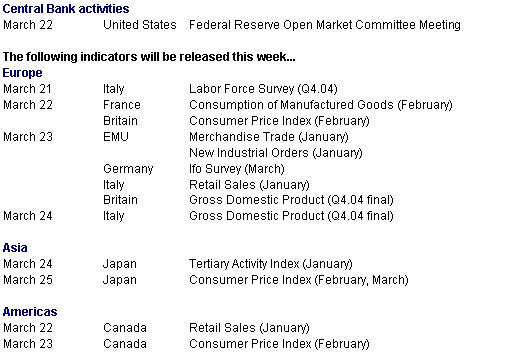Monday, March 21, 2005

Climbing oil addles investors
OPEC boosted crude oil output quotas by 500,000 barrels per day last week, but it doesn't seem to have had an impact on the upward trajectory of prices. Analysts think it will take something more surprising, like a bigger shift in the supply and demand balance, to convince speculators who have jumped into the market that the tides are turning and it is time to get out. But investors could be making the long-term bet that any pullback in price is temporary in nature, and that crude oil really is heading for $60 a barrel this year due mainly to strong demand in the U.S. and China.
The cartel also adopted a new reference price for its oil, setting up a basket containing 11 grades of crude produced by the group. However, the basket won't be used to set any oil prices as did its previous basket, but rather will be used to give a picture of the value of OPEC's output. Ali Naimi, the Saudi Arabian oil minister, said oil prices should be between $40 and $50 a barrel to protect global economic growth, saying the current level of about $55 (referring to the West Texas Intermediate price) is too high. OPEC traditionally looks to cut supplies in the second quarter, a period when demand dips as winter fuel demand eases. But the seasonal pattern might change with the emergence of China as a significant customer for imported oil.

Stocks took their cue from oil prices and generally traded in the opposite direction. When oil prices went up, stocks were down, with trading in both very choppy. However, the markets stabilized on Friday with many indexes able to reverse losses earlier in the week and end on a positive note. Eight of 13 indexes followed here were down on the week.
Global Stock Market Recap

Europe and Britain
Stocks in Europe and Britain were down last week as soaring crude oil prices, combined with a dour report from GM, depressed investors' views of auto stocks. Equities were particularly hard hit on Wednesday. European automakers such as BMW are citing the falling dollar in relation to the euro as a sales, hence profits dampener. Higher oil prices are making investors nervous because of the potential inflationary impact along with slower economic growth. On Thursday and Friday, though, European stocks recovered as prospects of future oil company earnings appeased investors. But the gains were not enough for the FTSE and DAX to recover their losses. The CAC managed to gain 1.6 points on the week.

New British budget depresses FTSE
In Britain, repercussions from the annual budget message affected property stocks negatively as new measures created a two-way pull in the sector. News that the government remained committed to the introduction of tax-efficient real estate investment trusts (REITS) and was aiming for legislation in the 2006 Financing Bill was warmly received. However, property stocks fell after the real estate sector was downgraded by an analyst to "underweight" after the reintroduction of stamp duty (land tax) for commercial property in disadvantaged areas.
In his budget message, Chancellor of the Exchequer Gordon Brown forecast the British economy will grow at its fastest pace in five years in 2005, suggesting tax revenue may pick up and help narrow a growing budget deficit in an election year. Brown forecast that GDP would increase between 3 percent and 3.5 percent, unchanged from the Treasury Department's December forecasts. But growth would slow in 2006 to between 2.5 percent and 3 percent. Brown noted that Britain is experiencing the longest period of sustained economic growth since records began in the year 1701. Three percent growth means that the economy is slated to grow faster than Japan and the EMU. Japan is expected to expand by 2.1 percent, EMU by 1.9 percent and the U.S. by 3.3 percent according to OECD's December forecasts.
Asia/Pacific
Asian stocks faltered on higher energy prices. However, equities stabilized Friday and the Topix and STI were able to reverse a losing week into a positive one while the Nikkei was able to cut losses. As in Europe, stocks were boosted by the energy sector as investors decided higher oil prices were good for earnings. In Japan, stocks were up, sending the Topix to its highest in almost 11 months. Media shares such as Fuji Television Network and Tokyo Broadcasting System advanced on speculation takeovers in the industry will boost shareholder returns. The Topix added 0.3 percent for its eighth weekly advance - the streak matched an eight-week period of gains in June and July 2003. However, the Nikkei was down 0.4 percent for the week. It should be noted that the end of Japan's fiscal year is fast approaching on March 31st and trading is affected by end-of-year positioning.

Bank of Japan keeps policy unchanged
The Bank of Japan Monetary Policy Committee met last week and voted to keep interest rates at almost zero to stem deflation and spur growth. The central bank maintained the level of cash it makes available to lenders at between �30 trillion ($287 billion) and �35 trillion. It also kept monthly purchases of government bonds from lenders at �1.2 trillion.
In a post-meeting news conference, Bank of Japan Governor Toshihiko Fukui said that the economy is poised for a sustained recovery as exports and production pick up and companies hire more workers. He said that the economy remains on a plateau, though the mechanisms for a sustained recovery are still in place as electronics companies complete reductions to inventories. He also said that wages have shown signs of bottoming out and consumer spending should be solid. Fukui said consumer prices are expected to continue falling slightly and that the Bank will need to watch oil prices and their effects on domestic and overseas economies. Fourth-quarter GDP was revised to an increase of 0.1 percent from the originally reported decline of 0.1 percent.
Currencies
The dollar was up against the euro and the yen last week as oil prices, a soaring U.S. current account deficit and a prospective Federal Reserve interest rate increase were taken into account by investors. As last week wound down, traders said the dollar had a better "tone" ahead of the FOMC meeting. The dollar was helped by Bank of Japan and Bank of Korea officials who once again downplayed the risk of currency diversification. The prospect of Asian central banks diversifying their currency holdings into euros, for example, has been roiling the currency markets with increasing frequency. In reality, increased trade within the region and with Europe has already achieved some diversification.

Data from the U.S. Treasury show that net portfolio inflows into the U.S in January jumped sharply to $91.5 billion, the second biggest inflow on record and more than large enough to cover the month's trade deficit of $58.3 billion. But on Wednesday, data showed that the fourth quarter U.S. current account deficit widened to $187.9 billion - 6.3 percent of GDP - and the dollar sank.
The yen edged down as investors feared that the soaring oil prices could stall already weak Japanese growth. Japan imports virtually all of its crude. Some of the dollar's gain was attributed to the slump in emerging market stocks, currencies and bonds that prompted investors to buy dollar-denominated assets. In addition, more investors are looking at the widening interest rate gap between Europe and the U.S. Interest rates in the U.S. are currently 50 basis points higher than those in Europe. And with the likelihood that the FOMC will increase rates another 25 basis points the spread would climb to 75 basis points.

Indicator scoreboard
EMU - February harmonized index of consumer prices was up 0.3 percent and 2.1 percent when compared with a year ago. Transport fuels jumped 2.2 percent while vegetables soared 4.6 percent and package holidays increased by 4 percent. Clothing prices were down 0.7 percent while footwear declined 1.8 percent and fish, 1.3 percent. HICP excluding energy, food, alcohol and tobacco, was up 0.2 percent and 1.4 percent on the year. HICP excluding only energy and unprocessed food - the ECB's preferred measure - was up 0.2 percent and 1.6 percent on the year.

January workday and seasonally adjusted industrial output was up 0.5 percent and 1 percent when compared with last year. Output was up in all categories with the exception of energy, which was down 0.9 percent. Output on the month was up in Germany, France, Italy, Belgium and Ireland. However output in Spain, the Netherlands, Portugal and Finland was down. Data were not available for Greece, Luxembourg and Austria.

Germany - March ZEW expectations index inched up to 36.3 from 35.9 in February. The increase was attributed to improvements in manufacturing orders and exports. Negatives were the stronger euro and higher oil prices. This survey of German financial experts was more pessimistic about current economic conditions than on expectations. The ZEW surveyed 311 German financial experts for their opinions on current economic conditions and the economic outlook between February 28th and March 14th.

February seasonally adjusted producer price index was up 0.4 percent and 4.2 percent when compared with last year. Excluding energy the PPI was up 0.2 percent and 3.1 percent on the year. Energy prices were up 0.9 percent with oil prices soaring 9.6 percent on the month. Rolled steel prices are also contributed to the PPI increase - up 0.9 percent and 39.5 percent on the year.

Italy - January seasonally and workday adjusted industrial output inched up 0.1 percent but was down 2.1 percent when compared with last year. All main categories were up on the month with the exception of intermediate goods. Only nine of 18 product categories were up on the month including textile & clothing, machines & mechanical equipment and electricity, gas & water. Petroleum refining and furniture sank.

January merchandise trade deficit with the rest of the world was �1.982 billion. Exports were up 11 percent while imports were up 7.4 percent on the year.

Britain - February seasonally adjusted producer output prices were up 0.4 percent and 2.8 percent when compared with last year. Core output prices, which exclude gasoline, tobacco, food and beverages, were up 0.3 percent and 2.7 percent on the year. Petroleum product prices were up 0.5 percent and 9 percent on the year. Producer input prices were up 0.1 percent and 10.7 percent on the year.

February claimant count unemployment declined by 700 but the claimant unemployment rate remained at 2.6 percent. Unemployment as measured by the International Labour Organization definition was up 22,000 for the three months ending in January. The ILO unemployment rate remained at 4.7 percent. Employment jumped by 127,000 in the three months November through January when compared with the previous three months. This was the highest employment level since records began in 1971.

Average earnings growth for the three months ending in January was up 4.4 percent when compared with the same three months a year earlier. Earnings growth excluding bonus payments also remained at 4.4 percent. January single month average earnings growth including bonuses edged down to 4.2 percent from 4.3 percent in December.

February retail sales volumes were up 0.2 percent and 3.6 percent when compared with last year. A decline in food store sales was more than offset by an increase in non-food sales. Sales were up for textile, clothing & footwear as well as in non-store retailing and repair. Sales declined in household good stores as well as non-specialized and other store sales.
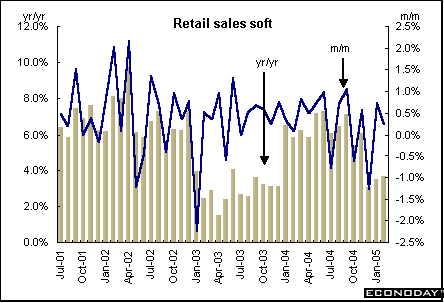
Asia
Japan - Fourth-quarter gross domestic product was up a revised 0.1 percent and was up 1 percent when compared with the fourth quarter of 2003. The original estimate had been a decline of 0.1 percent. GDP was up an annualized rate of 0.5 percent. Corporate capital spending was up a revised 0.1 percent rather than the previously reported 0.7 percent increase. The GDP deflator was down 0.4 percent. Personal consumption dropped 0.3 percent.
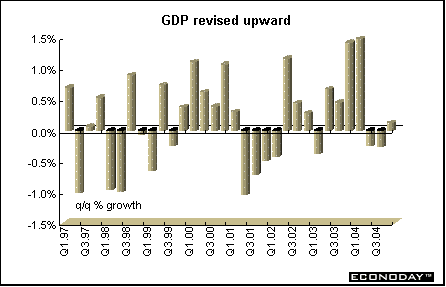
January revised seasonally adjusted industrial production was up 2.5 percent (from the originally reported 2.1 percent gain) and 1.5 percent when compared with last year (from the originally reported increase of 1.1 percent).
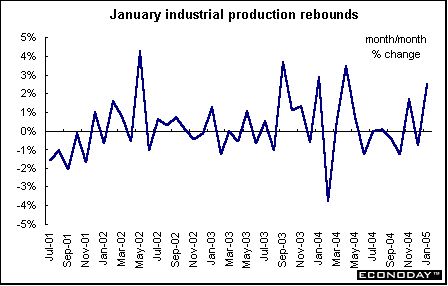
Americas
Canada - January factory shipments surged 3 percent and were 12.5 percent higher than January a year ago. Sixteen of 21 manufacturing industries posted increases accounting for 86 percent of total shipments. Durable goods manufacturers boosted output by a sizable 4.5 percent with industries such as aircraft & parts, heavy trucks, motor vehicles & machinery leading the way. Nondurable goods shipments were up 1 percent. The transportation equipment sector posted an 8.6 percent rise in shipments. Excluding the transportation sector, total manufacturing shipments remained up a healthy 1.5 percent. New orders soared 7.1 percent with most of the gain concentrated in the transportation sector. Excluding transportation, new orders are up a healthy 3.2 percent. Manufacturers' backlog of unfilled orders jumped 5.2 percent after dropping for five months.
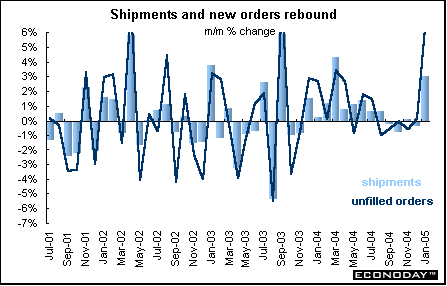
Bottom line
This week, which is a short one for most, will be dominated by the Federal Reserve meeting on Tuesday, even though the outcome should not surprise. Once again Fed watchers will be focusing on the post-meeting statement and that critical word - measured.
Looking Ahead: March 21 through March 25, 2005
